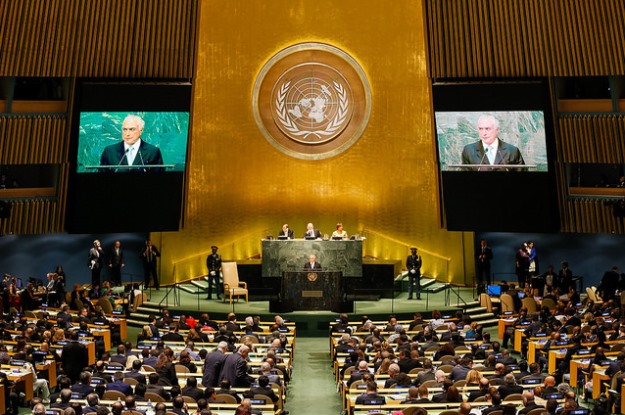At a United Nations summit in New York last week, Brazil’s President Michel Temer proudly declared that his country was home to more than 95,000 refugees. The revelation stirred admiring nods from diplomats in attendance at a time when the number of global refugees has surpassed that of World War II, creating a serious threat to global stability. Yet it turned out there was a problem with Temer’s speech – the number he gave was not correct.
That is because the 95,000 figure included roughly 85,000 Haitian migrants, who are escaping poverty but are not facing persecution at home. As a consequence, neither the U.N.’s agency for refugees (UNHCR) nor Brazil’s National Committee for Refugees (CONARE) regard them as refugees. Granted, Brazil’s decision to welcome so many Haitians over the past years is laudable (they received a humanitarian visa especially created for them by the Brazilian government), and one may question whether the international rules of who qualifies as a refugee, created in the 1950s, still make sense. And yet, experts were right to criticize Temer for massaging the numbers when it comes to such a sensitive subject for the international community.
In truth, as the Brazilian Justice Ministry’s own website states, Brazil is currently home to fewer than 9,000 refugees, about a fifth of whom are Syrians. That pales in comparison to the more than 20 million refugees in the world today.
But there is still time for Temer to make up for his lapse: Brazil should use the number he announced as its new target, and work towards accepting roughly 100,000 refugees. There are numerous good reasons to do so – political and economic.
Paradoxically, it was the Rousseff government, otherwise disinterested in global affairs, which first grasped the reality of the refugee crisis. While Brazil already maintained an open-door policy, Rousseff’s Minister of Justice Eugênio Aragão earlier this year initiated negotiations with the EU to bring more refugees (those involved privately spoke of 100,000 over five years) to South America’s largest nation, provided that European governments pay for their integration in Brazil.
Temer’s government, which took over in May as Rousseff was being impeached, has shown far less interest in the matter, unwilling to set specific goals. Negotiations with the EU are no longer a priority. That is bad news, because a deal would have generated tangible benefits both for Brazil, the refugees, and global stability – at a very limited cost, considering that additional financial support could be requested from richer countries unwilling to take refugees – such as Japan, China and Saudi Arabia.
There are three reasons why such a refugee deal would make sense for Brazil:
First, the arrival of refugees could help Brazil’s economy by reducing Brazil’s chronic shortage of skilled workers and by boosting innovation. Refugees – like migrants in general – rarely count on institutional channels or jobs in the public sector, where risk is not rewarded, and so are forced to innovate. The United States serves as a powerful example: Although the foreign-born represent only an eighth of the U.S. population, some 40 percent of Fortune 500 firms were founded by immigrants or their children. Over half of U.S. start-up companies valued at over $1 billion had at least one immigrant founder. Apple, Google, AT&T, Budweiser, Colgate, eBay, General Electric, IBM and McDonalds all owe their origin to a founder who was an immigrant or the child of an immigrant. The same is true in Brazil, where migrants were crucial to economic growth and innovation throughout the 20th century.
Critics often retort that refugees may import terrorism and generate xenophobia. Again, the U.S. serves as a useful example: It has accepted 3 million refugees since 1975, yet none has been convicted of domestic terrorism. Xenophobia is extremely unlikely to become a serious problem in Brazil. Brazil is, like the U.S., a country built on the backs of hard-working people from Europe, Asia and Africa, and its rich history of recurrent waves of immigration from all over the world have turned it into a culturally and ethnically diverse melting pot that shaped its national identity (even though racism remains a problem). Brazil is home to more than 10 million people of Arabic descent, and many occupy leading positions in business and government – such as Temer himself. In the university course I teach in São Paulo, my students’ surnames point to ancestors from Japan, Hungary, Portugal, Italy, Germany, Lebanon, Syria and Spain – a degree of diversity comparable to any major US university.
Yet today, Brazil is no longer an immigrant nation: In 1900, 7.3 percent of Brazil’s population was made up of immigrants, while today’s figure is a paltry 0.3 percent and declining. During the military dictatorship, immigrants came to be seen less as an opportunity and more as a national security concern, a notion that still influences the way the national bureaucracy deals with immigrants today. Given how few foreigners now live in the country, Brazil, with a population of 200 million could, in theory, absorb a million foreigners or two without causing a surge of xenophobia – the foreign-born populations would still be remarkably low.
Second, making a contribution on refugees would significantly boost Brazil’s reputation abroad and help partially offset the negative image its current economic and political crisis generates. With governments in Europe and the Middle East desperate to deal with the situation, actively seeking to find ways to bring more refugees to Brazil could help the country in future negotiations with policy makers most affected by the crisis – particularly considering that the rise of populists across Europe, partly in response to the refugee crisis, can be seen as a major threat to stable democracy across the continent.
Finally, as the world’s seventh-largest economy, Brazil no longer has the luxury to remain passive when it comes to facing the world’s most urgent global challenges. Whenever I make this argument, critics respond that since Brazil did not cause any war, it has no obligation to address its consequences. If applied to other global challenges such as climate change, this logic is dangerously simplistic and shortsighted, and will make meaningful international cooperation impossible. It also overlooks that even accepting 100,000 refugees over the next years would represent a mere 2 percent of Syrians who have fled their country – this would hardly put Brazil at the forefront of this global struggle. Considering the many potential gains at home, there has never been a better moment to step forward.









